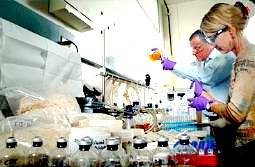Biologist
|
|

A biologist, also known as a life scientist, is an expert in some aspect of the science of biology, the discipline dealing with the study of living organisms and their vital processes. Many focus their research on some particular type of organism or a certain biological process such as metabolism, disease or evolution.
Research within this field attempts to understand organisms at all levels: for example, how they reproduce; how new types of organisms arise in a natural setting and how they can be artificially bred; how they ingest and process food; their classification and relationship through descent; their behavior, geographic distribution, physical appearance, chemical composition, and metabolism; their macroscopic and microscopic structure. Scientists of this type also study such questions as the interactions of organisms, particularly with regard to how microorganisms cause human disease. To see a list of the major branches of this field, click here.
The hard life of a biologist
Most, but not all life scientists, have laboratories. Those who don't may be concerned with purely theoretical issues or they may conduct their research on computers. Others play a role in supervising or facilitating the activities of other scientists, or they may spend their time "in the field" making observations or collecting samples in a natural setting. Scientists of this last type often face primitive living conditions, harsh environments and/or strenuous physical labor.
Even those who do carry out their work indoors in a laboratory setting are commonly exposed to a wide variety of hazards such as infectious or otherwise dangerous organisms, toxic chemicals, and tissue-damaging radiation (in particular, x-rays, ultraviolet light, and radioactive isotopes).
Though biology departments for the most part run on a nine-to-five schedule, many projects require researchers to work odd hours, sometimes deep into the night keeping tabs on study organisms and experiments that won't wait till the morning after breakfast. That's why you see those lights on when you drive by a life sciences building in the wee hours of the morning. The sleep schedules of graduate students, especially, are driven by the demands of research.
But not all biologists are investigators. Actually, although it is widely supposed that all real scientists must conduct research, many professional life scientists do not in any way actively collect new information about natural phenomena. Many teach full-time and do no research whatsoever. Nor do many others, for example, school and university administrators, engage in research.
So if you're planning a career as a researcher in the life sciences, remember that it's not easy work. You'll need a real fascination with your work to carry you through.
Read about disciplines in this field >>
Most shared on Macroevolution.net:
Human Origins: Are we hybrids?
On the Origins of New Forms of Life
Mammalian Hybrids
Cat-rabbit Hybrids: Fact or fiction?
Famous Biologists
Dog-cow Hybrids
Prothero: A Rebuttal
Branches of Biology
Dog-fox Hybrids